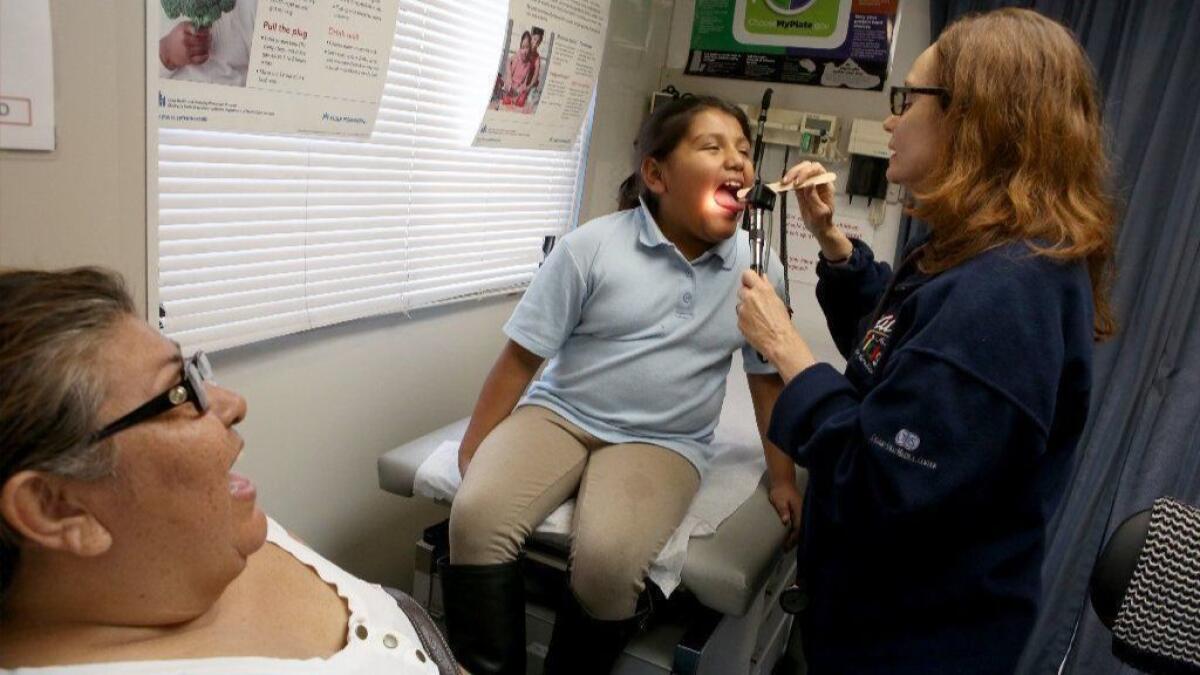Nurse practitioners win first round against doctors with bill to expand patient care

Nurse practitioners, who undergo more training than registered nurses, have been lobbying the Legislature for years to care for patients on their own without a physician’s approval. They’ve argued this change in state law would ensure the state’s aging population has access to medical care.
The California Medical Assn., the powerful lobbying arm for the state’s doctors, has so far blocked those efforts. But this year could be different, with a key lawmaker, Assemblyman Jim Wood (D-Healdsburg), switching sides.
Wood, who voted against a 2015 bill to grant autonomy to nurse practitioners, is authoring this year’s version of the legislation. Wood said he became convinced a change was needed because of the growing gap between primary care providers and patients, particularly in rural and inner-city areas. He hopes other reluctant lawmakers will flip, too.
“A lot of people are lacking care,” said Wood, who is a dentist. “As we expand more and more to offering care to everyone, to not have providers is an empty promise and we can’t do that in California.”
Assembly Bill 890 faced its first hearing in the state Legislature on Tuesday, where the bill was approved 16-0 by the Assembly Business and Professions Committee. Several lawmakers, however, said they could end up voting against the measure if it makes it to a full Assembly vote and if issues raised by doctors are not addressed.
The bill still has a difficult path ahead to clear the Assembly before it would then go to the Senate, which has been welcoming to previous attempts to expand the scope of practice for nurse practitioners. The bill next heads to the Assembly Appropriations Committee, a common graveyard for legislative attempts.
Megan Allred, a lobbyist for the California Medical Assn., said negotiations with Wood would continue, but that “there are significant areas in which we differ from the author and supporters of the bill.”
Among the changes Wood made to the bill in hopes of addressing concerns from the doctors group were provisions to create a new licensing board to oversee nurse practitioners who work independently and to require a minimum level of experience before a nurse practitioner can work without a doctor’s oversight.
The medical association said it continues to have concerns that nurse practitioners lack the extensive education or clinical training needed to practice without supervision by a doctor. The group said there are more effective ways to address the shortage of medical providers, such as expanding doctor residency programs.
The California Future Health Workforce Commission, a group that includes Wood and is co-chaired by University of California President Janet Napolitano, released a report in February proposing that the state invest in expanding doctor training programs and create incentives like loan forgiveness and scholarships for students who pledge to work in rural areas of the state where shortages are most severe.
But, the group also urged lawmakers to grant nurse practitioners across the state more autonomy as part of a $3-billion plan to ensure California can meet the medical needs of residents.
Two previous bills by former state Sen. Ed Hernandez (D-West Covina) in 2013 and 2015 passed the Senate, but failed in the Assembly.
Wood said working on the commission’s report, which highlighted the state’s looming healthcare crisis, prompted him to reevaluate his opposition to expanding the role of nurse practitioners in the state. The state does not currently have enough doctors and nurse practitioners and more than one-third of those who are practicing are approaching retirement age.
California is expected to face a massive workforce shortage in the next decade, with the state needing 4,100 more doctors and 600,000 additional home care workers, the commission said in its report.
At the same time, Gov. Gavin Newsom wants to widely expand healthcare access for lower-income and immigrant communities. Newsom proposed extending Medi-Cal coverage to young adults who are in the U.S. illegally and providing more subsidies for middle-class families struggling to afford health insurance, with Democratic lawmakers taking up both of those issues in the Legislature.
Surani Kwan, a nurse practitioner at Russian River Clinic in Sonoma County, said this year’s effort comes as more people are seeing the effects of the doctor shortage and have experience being treated by nurse practitioners.
California is one of 28 states that require nurse practitioners to work under a doctor’s oversight, although the state does not require the physician to be in the same clinic or city, just available by phone.
Kwan said under AB 890, current patients would continue to have the same quality of care, but the bill would ease burdens for those setting up new practices in places like the Central Valley where it can be difficult or expensive to contract with a doctor.
“Physicians don’t sit at your side and supervise what you do,” Kwan said. “This will change the face of healthcare. It doesn’t change what we do, we will do what we are trained to do in school. It will enable nurse practitioners to run clinics without having to have a physician sign off.”
Follow @MelodyGutierrez on Twitter and sign up for our Essential Politics newsletter.
More to Read
Get the L.A. Times Politics newsletter
Deeply reported insights into legislation, politics and policy from Sacramento, Washington and beyond. In your inbox three times per week.
You may occasionally receive promotional content from the Los Angeles Times.







